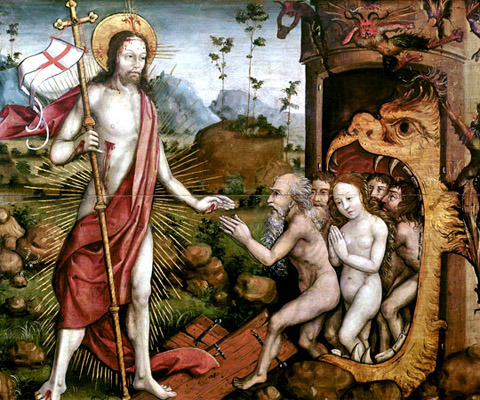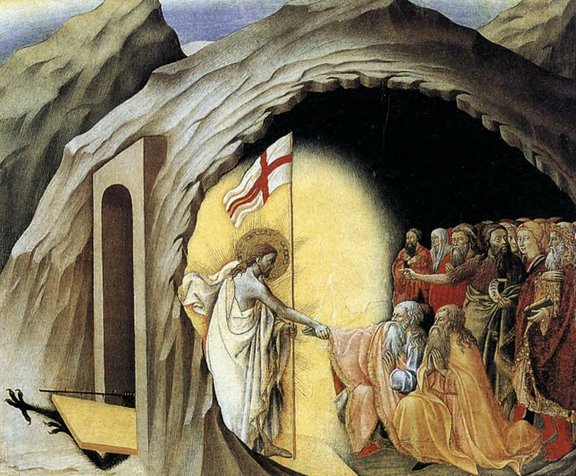II. WAYS OF COMING TO KNOW GOD
31 Created in God's image and called to know and love him, the person who seeks God discovers certain ways of coming to know him. These are also called proofs for the existence of God, not in the sense of proofs in the natural sciences, but rather in the sense of "converging and convincing arguments", which allow us to attain certainty about the truth. These "ways" of approaching God from creation have a twofold point of departure: the physical world, and the human person.
32 The world: starting from movement, becoming, contingency, and the world's order and beauty, one can come to a knowledge of God as the origin and the end of the universe.
- As St. Paul says of the Gentiles: For what can be known about God is plain to them, because God has shown it to them. Ever since the creation of the world his invisible nature, namely, his eternal power and deity, has been clearly perceived in the things that have been made.7
And St. Augustine issues this challenge: Question the beauty of the earth, question the beauty of the sea, question the beauty of the air distending and diffusing itself, question the beauty of the sky. . . question all these realities. All respond: "See, we are beautiful." Their beauty is a profession [confessio]. These beauties are subject to change. Who made them if not the Beautiful One [Pulcher] who is not subject to change?8One of the huge problems is the lack of reflection among the young. When do they stop their stampede towards pleasure in order to think about life, God, the universe...as it were......
34 The world, and man, attest that they contain within themselves neither their first principle nor their final end, but rather that they participate in Being itself, which alone is without origin or end. Thus, in different ways, man can come to know that there exists a reality which is the first cause and final end of all things, a reality "that everyone calls God".10
35 Man's faculties make him capable of coming to a knowledge of the existence of a personal God. But for man to be able to enter into real intimacy with him, God willed both to reveal himself to man and to give him the grace of being able to welcome this revelation in faith. The proofs of God's existence, however, can predispose one to faith and help one to see that faith is not opposed to reason.
Section 33 is important for this discussion. All humans have reason and therefore a sense of goodness and a conscience. Reason separates us from the other animals which only have instincts.
One of the gravest false teachings of the day is the denial of reason. Reasonable people can come to know God and be open to more knowledge which God has given us in revelation.
Reason and revelation form our faith. Here is the CCC again.
III. THE KNOWLEDGE OF GOD ACCORDING TO THE CHURCH
36 "Our holy mother, the Church, holds and teaches that God, the first principle and last end of all things, can be known with certainty from the created world by the natural light of human reason."11 Without this capacity, man would not be able to welcome God's revelation. Man has this capacity because he is created "in the image of God".12
37 In the historical conditions in which he finds himself, however, man experiences many difficulties in coming to know God by the light of reason alone:
- Though human reason is, strictly speaking, truly capable by its own natural power and light of attaining to a true and certain knowledge of the one personal God, who watches over and controls the world by his providence, and of the natural law written in our hearts by the Creator; yet there are many obstacles which prevent reason from the effective and fruitful use of this inborn faculty. For the truths that concern the relations between God and man wholly transcend the visible order of things, and, if they are translated into human action and influence it, they call for self-surrender and abnegation. The human mind, in its turn, is hampered in the attaining of such truths, not only by the impact of the senses and the imagination, but also by disordered appetites which are the consequences of original sin. So it happens that men in such matters easily persuade themselves that what they would not like to be true is false or at least doubtful.13
IV. HOW CAN WE SPEAK ABOUT GOD?
39 In defending the ability of human reason to know God, the Church is expressing her confidence in the possibility of speaking about him to all men and with all men, and therefore of dialogue with other religions, with philosophy and science, as well as with unbelievers and atheists.
40 Since our knowledge of God is limited, our language about him is equally so. We can name God only by taking creatures as our starting point, and in accordance with our limited human ways of knowing and thinking.
41 All creatures bear a certain resemblance to God, most especially man, created in the image and likeness of God. The manifold perfections of creatures - their truth, their goodness, their beauty all reflect the infinite perfection of God. Consequently we can name God by taking his creatures" perfections as our starting point, "for from the greatness and beauty of created things comes a corresponding perception of their Creator".15
42 God transcends all creatures. We must therefore continually purify our language of everything in it that is limited, image-bound or imperfect, if we are not to confuse our image of God--"the inexpressible, the incomprehensible, the invisible, the ungraspable"--with our human representations.16 Our human words always fall short of the mystery of God.
43 Admittedly, in speaking about God like this, our language is using human modes of expression; nevertheless it really does attain to God himself, though unable to express him in his infinite simplicity. Likewise, we must recall that "between Creator and creature no similitude can be expressed without implying an even greater dissimilitude";17 and that "concerning God, we cannot grasp what he is, but only what he is not, and how other beings stand in relation to him."18
I am convinced that young people choose and as the text highlighted above states, persuade themselves against reason to accept evil.
That children do not use reason at the age of adolescence is the fault of the parents and teachers, in this age of relativism. But, still, God gives grace to all and invites all to come to Him.
Do we need revelation? Yes,and we need missionaries. But, reason can lead one to be open to the Gospel message.
To deny reason and free will is heresy. Remember, Christ descended into hell, as stated in our creed, and released those who waited for His Redemption. Adam and Eve are the first who come to mind and we honor them as saints.
Those in Judaism who accepted God's Law and revelation were also among those freed from hell. We call these men and women saints-Judith, Esther, Ruth, Joshua, Jacob, Abraham, Isaac, Moses, David, the prophets, the Maccabees, etc.
They believed in the promise without the fullness of revelation. These were the righteous, being made so by faith. They believed in the revelation given to them. And, through the use of reason.
Revelation and Reason--both God's gifts to us....
To be continued....

